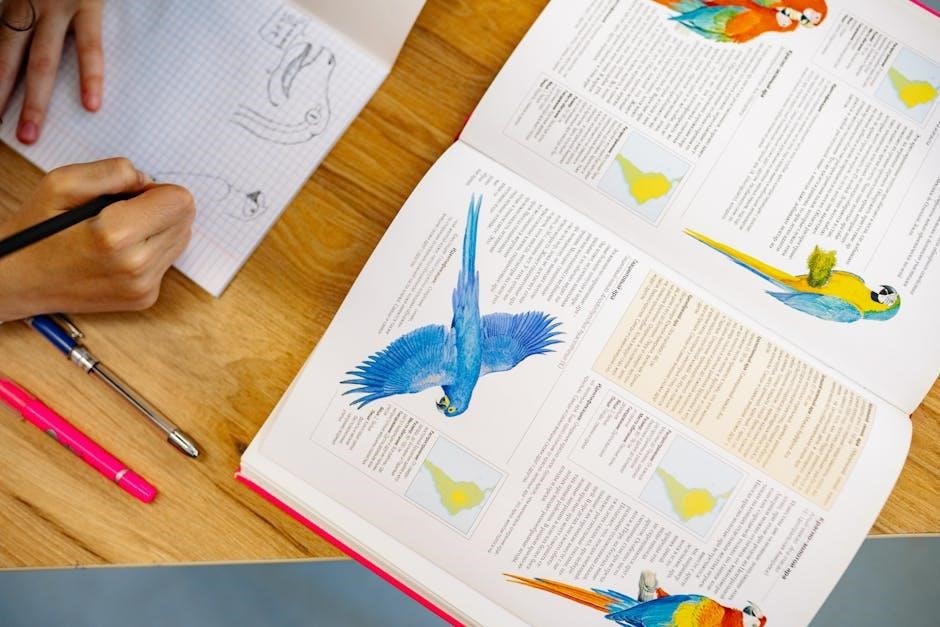book of genesis study guide pdf
The Book of Genesis‚ often called the “Book of Beginnings‚” lays the foundation for understanding the Bible. It explores creation‚ the fall of humanity‚ and God’s plan of redemption‚ setting the stage for His relationship with humanity. This study guide helps readers grasp the fundamentals of Genesis‚ applying its timeless lessons to daily life and deepening their understanding of God’s sovereignty and grace.
1.1 Importance of Genesis in Biblical Context
Genesis‚ the first book of the Bible‚ is foundational‚ introducing themes like creation and the fall‚ which set the stage for God’s plan of redemption. It provides the origins of humanity’s relationship with God and the basis for understanding the rest of Scripture‚ making it essential for grasping the Bible’s overarching narrative and theological framework.
1;2 Overview of the Book’s Structure
The Book of Genesis is divided into 50 chapters‚ structured to reveal God’s plan progressively. The first 11 chapters focus on primeval history‚ covering creation‚ the fall‚ and early humanity. Chapters 12-50 shift to the patriarchs‚ detailing God’s covenant with Abraham‚ Isaac‚ and Jacob. This division highlights the transition from universal history to the specific story of God’s chosen people‚ emphasizing His redemptive plan from creation to the patriarchal narratives.
1.3 Key Themes and Messages
Genesis explores themes of creation‚ sin‚ redemption‚ and covenant. It reveals God’s sovereignty and His plan to restore humanity through faith and obedience. The book emphasizes the origin of humanity’s relationship with God‚ the consequences of disobedience‚ and the promise of divine grace. These themes form the theological foundation for understanding God’s character and His ultimate plan of salvation‚ making Genesis a cornerstone of biblical theology and personal spiritual growth through its study guide insights.

Historical Background and Authorship
Traditionally attributed to Moses‚ Genesis is believed to have been written during the Israelites’ wilderness wanderings. Its composition reflects ancient Near Eastern contexts and theological themes‚ blending history and revelation to establish Israel’s identity and God’s covenant promises‚ while scholarly debates like the Documentary Hypothesis explore its potential sources and editorial process.
2.1 Traditional View of Moses as the Author
The traditional view attributes the authorship of Genesis to Moses‚ based on ancient Jewish and Christian sources. Moses is believed to have written the book during the Israelites’ wilderness journey‚ compiling earlier oral traditions and divine revelations. This view emphasizes Moses’ role as a prophet and leader‚ entrusted with recording God’s creation account and the early history of humanity‚ laying the theological foundation for Israel’s covenant identity and relationship with Yahweh.
2.2 Historical Context of the Book’s Composition
Genesis is traditionally believed to have been written during the Israelites’ wilderness wanderings‚ around 1400–1200 BCE. Moses‚ as the author‚ drew from earlier oral traditions and divine revelations‚ compiling them into a cohesive narrative. The book reflects the cultural and theological context of ancient Israel‚ addressing themes like creation‚ sin‚ and redemption‚ which were crucial for shaping Israel’s identity and understanding of their covenant with God during this formative period.
2.3 The Documentary Hypothesis and Its Implications
The Documentary Hypothesis proposes that Genesis was compiled from four distinct sources (J‚ E‚ D‚ P)‚ each with unique styles and theological emphases. This theory challenges the traditional view of Moses as the sole author‚ suggesting instead a gradual composition over centuries. It highlights textual inconsistencies and repetitions‚ offering a nuanced understanding of the book’s development and the evolution of its narratives.
While this hypothesis has influenced modern scholarship‚ it remains controversial among traditionalists. It underscores the complexity of Genesis’ origins‚ encouraging deeper exploration of its literary and theological layers‚ while also sparking debates about its historical accuracy and authorship.
Major Events in Genesis
Genesis recounts pivotal events shaping human history‚ including creation‚ the fall‚ Noah’s flood‚ the Tower of Babel‚ and the patriarchal narratives‚ revealing God’s plan and humanity’s journey.
3.1 Creation Account (Chapters 1-2)
The creation account in Genesis 1-2 describes God’s orderly creation of the world in six days‚ culminating in the formation of humanity in His image. The narrative emphasizes God’s sovereignty and purpose‚ with each day building on the previous‚ establishing order and life. The seventh day‚ a day of rest‚ highlights God’s intent for humanity to share in His rest. This foundational story sets the stage for understanding God’s relationship with creation and humanity’s unique role within it.
3.2 The Fall of Man and the Consequences of Sin (Chapter 3)
Genesis 3 recounts the Fall of Man‚ where Adam and Eve‚ deceived by the serpent‚ disobeyed God’s command not to eat from the tree of knowledge. This act of rebellion introduced sin into humanity‚ leading to separation from God and a cursed world. The consequences included suffering‚ death‚ and expulsion from Eden‚ but also revealed God’s plan for redemption‚ as He promised a future savior to restore humanity’s relationship with Him.
3.3 The Story of Noah and the Flood (Chapters 6-9)
Genesis 6-9 recounts God’s judgment on humanity’s wickedness through a global flood. Noah‚ a righteous man‚ obeyed God’s command to build an ark‚ saving his family and two of every animal. After 40 days of rain‚ the flood destroyed all life outside the ark. God then established a covenant with Noah‚ promising never to destroy the earth with a flood again‚ symbolized by the rainbow. This story underscores divine justice‚ mercy‚ and redemption.
3.4 The Tower of Babel and the Dispersion of Nations (Chapter 11)
Genesis 11 recounts the story of humanity uniting to build the Tower of Babel‚ defying God’s command to fill the earth. God‚ seeing their pride‚ confused their language‚ causing dispersion across the globe. This event explains the origin of diverse languages and cultures‚ highlighting God’s sovereignty and humanity’s tendency toward rebellion. It serves as a reminder of divine judgment and the necessity of humility.

Key Figures in Genesis
The Book of Genesis introduces central figures like God‚ Adam‚ Eve‚ Noah‚ Abraham‚ Isaac‚ Jacob‚ and Joseph‚ each playing pivotal roles in the narrative of creation‚ covenant‚ and redemption.
4.1 God as the Central Character
God is the central character in Genesis‚ depicted as the omnipotent Creator who establishes the world and initiates relationships with humanity. His attributes of sovereignty‚ grace‚ and judgment are evident throughout the narrative. From creation to covenant promises‚ God’s divine plan unfolds‚ showcasing His redemptive purpose and unwavering commitment to humanity despite sin and rebellion.
4.2 Adam and Eve: The First Humans
Adam and Eve‚ the first humans‚ were uniquely created in God’s image‚ reflecting His glory and establishing a direct relationship with Him. Their story in Genesis highlights the temptation‚ the Fall‚ and its consequences‚ introducing themes of sin‚ guilt‚ and redemption. Their expulsion from Eden marks the beginning of human struggle and God’s unfolding plan to restore humanity through future generations.
4.3 Noah: The Righteous Survivor
Noah‚ a righteous and blameless man‚ obeyed God’s command to build an ark‚ saving his family and two of every kind of animal from the flood. His faithfulness highlighted God’s justice and mercy. The flood‚ a judgment on corruption‚ reset the earth‚ and God’s covenant with Noah promised never to destroy life with a flood again‚ symbolized by the rainbow‚ a sign of divine promise and hope.
4.4 Abraham: The Father of Faith
Abraham‚ a central figure in Genesis‚ exemplifies faith and obedience. Called by God to leave his homeland‚ he trusted in divine promises‚ demonstrating unwavering faith despite challenges. His journey to Canaan and the covenant established with God marked the beginning of a special relationship. Abraham’s willingness to sacrifice Isaac showcased his deep trust in God’s plan‚ solidifying his legacy as the father of faith and a model of surrendered obedience to God’s will.
4.5 Isaac and Jacob: The Continuation of the Covenant
Isaac and Jacob play pivotal roles in continuing the covenant established with Abraham. Isaac’s birth to Sarah‚ despite her barrenness‚ fulfilled God’s promise‚ reinforcing the divine plan. Jacob‚ through his struggles and transformations‚ inherited the covenant‚ becoming the father of the twelve tribes of Israel. Their stories highlight God’s faithfulness‚ as He worked through their imperfections to sustain His promise‚ ensuring the covenant’s continuation and the eventual formation of a nation. Their legacies underscore God’s sovereignty and grace.
4.6 Joseph: The Journey from Slave to Leader
Joseph’s life exemplifies God’s providence and redemption. Sold into slavery by his brothers‚ Joseph rose to become a trusted leader in Egypt‚ managing resources and interpreting dreams. His unwavering faith and integrity in the face of adversity demonstrated God’s grace. Through his journey‚ Joseph forgave his brothers and trusted God’s plan‚ showcasing how divine purpose can transform suffering into leadership and blessings‚ reflecting the themes of redemption and covenant fulfillment. His story remains a powerful testament to faith and resilience.
Major Themes in Genesis
Genesis explores central themes such as creation‚ sin‚ redemption‚ covenant‚ faith‚ and humanity‚ providing profound insights into God’s plan and the human condition.
5.1 Creation and the Nature of God
The account of creation in Genesis reveals God as a purposeful‚ omnipotent Creator who spoke life into existence. The structured days of creation highlight His sovereignty and wisdom‚ while the seventh day of rest underscores His transcendence. The creation of humans in God’s image emphasizes His relational nature‚ establishing a foundation for understanding humanity’s purpose and God’s desire for a personal connection with His creation.
5.2 Sin and Redemption
The Book of Genesis introduces the concept of sin through Adam and Eve’s disobedience‚ leading to separation from God. This event sets the stage for humanity’s need for redemption. The narrative progresses with examples like Cain’s rebellion and Noah’s Flood‚ illustrating sin’s consequences and God’s judgment. Yet‚ Genesis also offers glimpses of redemption through promises of a Savior and the establishment of covenant relationships‚ emphasizing God’s grace and plan to restore humanity.
5.3 Covenant and Promise
The Book of Genesis establishes the concept of covenant as a central theme‚ showcasing God’s faithfulness and promises to humanity. From Adam to Abraham‚ covenants highlight God’s commitment to His people‚ emphasizing trust and obedience. Abraham’s covenant‚ marked by circumcision‚ signifies God’s promise of land‚ descendants‚ and blessings. These promises underscore God’s sovereignty and grace‚ forming the foundation of His relationship with humanity and setting the stage for future biblical narratives.
5.4 Faith and Obedience
Faith and obedience are cornerstone themes in Genesis‚ demonstrated through key figures like Abraham‚ Noah‚ and Joseph. Abraham’s willingness to sacrifice Isaac exemplifies unwavering faith‚ while Noah’s obedience in building the ark despite uncertainty highlights trust in God’s commands. These narratives illustrate how faith and obedience lead to fulfillment of God’s promises and serve as a blueprint for living a life aligned with divine will‚ emphasizing the importance of trusting and following God’s plan.
5.5 The Nature of Humanity
Genesis reveals the nature of humanity as created in God’s image‚ possessing inherent dignity and purpose. The fall in Eden introduces sin‚ highlighting humanity’s vulnerability and tendency toward rebellion. Yet‚ God’s continued relationship with humanity shows His grace and desire for redemption; This duality of human nature—capable of both good and evil—underscores the complexity of God’s creation and the ongoing struggle between obedience and disobedience‚ central to the human experience.
Study Methods and Tips
Effective study methods include structured lessons‚ memory verses‚ and practical application. Use biblical commentaries and resources to deepen understanding and apply Genesis’ lessons to daily life.
6.1 How to Approach a Study Guide
Begin with structured lessons‚ starting each session with a memory verse to anchor key truths. Use biblical commentaries and resources to enhance understanding. Engage in personal reflection by journaling insights and questions. Apply lessons practically by relating Genesis’ themes to modern life‚ fostering spiritual growth and deeper connection with God’s Word. Regular review and discussion with others can further enrich your study experience.
6.2 Using Biblical Commentaries and Resources
Biblical commentaries and study resources enrich your understanding of Genesis by providing historical context‚ theological insights‚ and practical applications. Use reputable commentaries to explore complex passages and gain a deeper grasp of biblical themes. Additionally‚ study notes and guides offer structured approaches to learning‚ helping you connect Genesis’ teachings to modern life. These tools are invaluable for enhancing your study and fostering a more meaningful engagement with Scripture.
6.3 Engaging in Personal Reflection and Application
Personal reflection and application are crucial for a meaningful study of Genesis. Take time to journal insights‚ pray over teachings‚ and consider how biblical truths apply to your life. Reflect on creation‚ sin‚ and redemption‚ seeking lessons for personal growth. Engage with questions like‚ “What does this reveal about God?” or “How can I live out this truth?” This fosters a deeper connection to Scripture and transforms your faith journey.
Application to Daily Life
Genesis offers timeless lessons for modern living‚ emphasizing trust in God’s sovereignty‚ nurturing covenant relationships‚ and understanding sin’s consequences. Its truths inspire faithful living and redemption-seeking hearts.
7.1 Lessons on Faith and Trust
Genesis teaches profound lessons on faith and trust through examples like Abraham’s unwavering belief in God’s promises and Noah’s obedience despite uncertainty. These stories highlight the importance of trusting God’s sovereignty‚ even when circumstances seem insurmountable. By studying these accounts‚ readers can deepen their faith‚ learning to rely on God’s plan and timing in their own lives‚ fostering a stronger spiritual foundation.
7.2 Understanding God’s Sovereignty
Genesis reveals God’s sovereignty through His creation and governance of the world. From the orderly creation account to His dealings with individuals like Abraham and Joseph‚ God’s divine plan and control are evident. The book shows how human decisions and actions unfold within His greater will‚ teaching us to trust His wisdom and purpose‚ even in uncertain circumstances‚ and to recognize His ultimate authority over all creation.
7.3 The Importance of Covenant Relationships
Genesis emphasizes the significance of covenant relationships‚ starting with God’s promises to Adam‚ Noah‚ and Abraham. These covenants establish trust‚ faith‚ and obedience as essential components of a relationship with God. Through Abraham’s covenant‚ God forms a chosen people‚ illustrating His faithfulness and grace. These relational agreements highlight God’s desire for connection and the importance of loyalty‚ serving as a foundation for understanding divine-human interactions and their enduring implications.
7.4 Dealing with Sin and Redemption
Genesis introduces the concept of sin through Adam and Eve’s disobedience‚ revealing its consequences and humanity’s need for redemption. The fall illustrates sin’s destructive nature‚ while God’s response shows His mercy and plan for redemption. This narrative sets the stage for understanding sin’s impact and God’s ultimate plan to restore humanity through future promises and covenants‚ emphasizing grace and forgiveness as central to His relationship with humanity.

